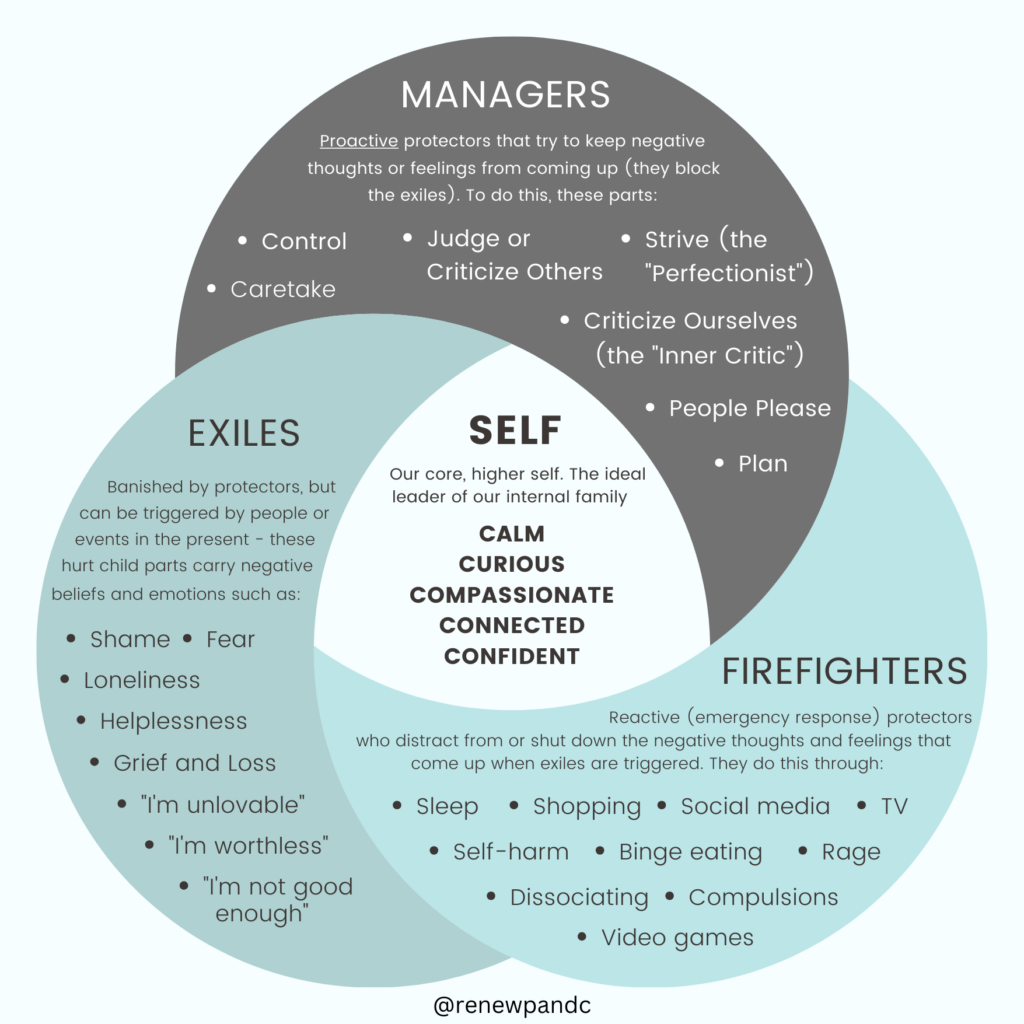“Internal Family Systems” therapy has been gaining a lot of traction in recent years. This post offers a thorough introduction to internal family systems therapy: the model behind it, what it’s used for, how it works and the evidence supporting it, and how to know if it might be the right kind of therapy for you!
What is the Internal Family Systems Model?
Internal Family Systems (known as IFS) is a model for understanding and changing “intrapsychic” systems – so the systems that exist in our minds, in our own inner world. IFS recognizes that the human mind is not unitary or singular.
Instead, it is naturally subdivided into different “parts” or subpersonalities. We each have our own overall personality, but everyone experiences being a little bit of a different person depending who they are with or what they are doing. This is simply the different parts of ourselves showing up. Note: to be clear this is not the same as what used to be called “multiple personality” (now Dissociative Identity Disorder).
The guy who created this therapy model, Dick Schwartz, realized that these parts functioned like people of different ages, talents, and temperaments. Together, they basically make up their own internal family! Dick Schwartz then figured out that if therapists viewed people’s internal world from the lens of family systems theory and applied family therapy techniques to the internal family, they could help people create a much more harmonious system in their own minds.
The Positive Intent of Parts
The IFS model views each part as having its own role. This is whatever job that a part performs to help you (which could be mostly internal, or could involve how the part acts out in the world and with other people.) A key principle of the IFS model is the idea of positive intent: believing that all parts are valuable and want to play constructive, helpful inner roles.
Unfortunately, external influences such as people or events can force our parts to take on certain roles and responsibilities to help us get through difficult experiences. These roles may continue to work for a time, but staying in these roles when they are no longer necessary can ultimately wreak havoc on the entire system. Nonetheless, all our parts play their roles in an attempt to help us or protect us – even if what they do to try to help is ultimately unhelpful… or even scary or harmful.
An Internal Family Systems Parts Map
IFS groups all the parts that make up our internal family into a few different categories, so let’s map them out:

SELF
At the core or center of every person is the Self (with a capital S). This is the “you” that is not a part. Sometimes referred to as the true self, essential self, or higher self, the Self can be described by a few key traits. They all start with C to make it easy to remember! The Self is:
- calm (it can witness the pain of a part without being overwhelmed)
- curious (it is open and accepting, not judgmental)
- compassionate (it is kind and supportive)
- connected (it wants relationships with the parts, not to get rid of them)
The Self is the ideal leader of the internal family. With a healthy internal system, all your parts trust you (in Self) to make decisions and handle problems. But this Self-leadership can be lost when one or more parts merge with the Self, which is called blending. When you are fully blended with a part, it basically takes over your consciousness. You feel the part’s feelings, believe its attitudes are true, and act according to the part’s impulses.
But if the Self can unblend, and become differentiated enough from these parts, then it can resume its role as leader and work effectively with different parts that are currently causing problems to ultimately establish a more harmonious system.
EXILES
Exiles are hurt child parts that are banished by protector parts. This could be for the exiles’ own protection, or for the protection of the Self and other parts from the exiles. Exiles hold painful emotions and negative beliefs that are called burdens, and they can become increasingly extreme in their efforts to be cared for and share their story. These parts are still stuck in childhood and become triggered by people or situations in the present that are similar in some way to what they experienced in the past.
Examples of thoughts and feelings exiles may be holding include:
- anger, fear, dependency, loneliness, shame
- not being good/smart/pretty/skinny/etc. Enough
- feeling unlovable, worthless, powerless or unsafe
PROTECTORS
Protectors are our “defense mechanisms.” Managers are proactive protectors of the system. They attempt to keep someone stable and in control of every situation and relationship in order to protect them from feeling hurt or rejected. They are vigilant in trying to prevent exiles from being triggered and flooding the internal system with emotion. Common types of manager parts include the Inner Critic, and parts who judge, control, plan, strive, please, and keep the peace.
Firefighters, sometimes known as “escape artists,” are reactive protectors. They go into action after exiles have been activated, to calm the exiles or to distract the system from them. They are an emergency response to extinguish the sensation of emotional pain. Some examples of firefighters include drugs/alcohol, sleep, shopping, food, sex, diet, exercise, TV, social media, feeling numb/disassociating, self-harm, and being absorbed in obsessions, compulsions, or fantasies (including suicidal ideation). Firefighters can be anything that helps you shut down, numb, or get away from uncomfortable feelings.
You can see from the list above that firefighters often use extreme measures that managers hate. When two protectors are in conflict over how to handle an exile, this is called polarization. Have you ever felt like you are at war with yourself? Or something along the lines of an angel on one shoulder and the devil on another, each trying to tell you what to do? That is an example of polarization.
What is Internal Family Systems Therapy Used For?

People tend to come to therapy when their internal system becomes way off balance, because their emotions or thoughts or behaviors – their parts – have gotten too extreme and are causing problems. As a type of therapy, IFS can be used to address all kinds of mental and emotional problems: depression, anxiety, low self-esteem, relationship conflict, imposter syndrome, disordered eating, substance use, chronic insomnia, etc. IFS can also be very helpful if you are struggling to process or move past a loss or traumatic experience.
Postpartum Rage
Let’s look at postpartum rage as an example to give you an idea of a problem that might lead someone to come to therapy, and how to understand this in the context of parts. Parenthood brings a heightened sense of both responsibility and vulnerability, which can cause exiled parts to emerge. So maybe a new mom, who has never really had “anger problems” before, starts to get incredibly angry when her baby is crying and just will not be soothed. This situation could potentially trigger the mom’s parts that hold feelings of helplessness or thoughts of “I’m a bad mom.”
Or, let’s say the other parent doesn’t ever seem to have the problem of not being able to soothe the baby. Maybe that situation could trigger the mom’s parts that are holding feelings of failure, or thoughts of “my baby doesn’t love me.”
If that mom’s internal system knows that those exiled parts would flood her with emotion and doesn’t believe she could handle all that right now, a protector part is going to show up. In this case, one that gets mad. Feeling helpless or like you’re failing is vulnerable and scary. But anger feels powerful! It makes you feel like you’re in control. The problem for this mom is that the mad part yells at the baby. And now other parts holding guilt and shame are triggered and more protectors have to step in, and on and on it goes… So what can this mom do? Now we’ll talk about how IFS can help all those parts.
How Does Internal Family Systems Therapy Work?
The first goal in IFS therapy is for someone to reconnect with their Self. IFS refers to this as accessing Self-energy, and this is accomplished by unblending with parts who have taken over and re-establishing the Self as the internal leader.
Next, based on IFS’s belief in the positive intention of all parts, someone would then work to identify and understand their protector parts. They would learn what these parts believe they are protecting them from, and how they do that. When these parts feel heard and validated, they tend to soften and not act in such extreme ways.
Finally, the goal is to identify exiled parts that are being triggered and help them release the negative emotions and beliefs they are holding. IFS calls this process unburdening. If you are familiar at all with EMDR therapy, unburdening in IFS and reprocessing in EMDR function very similarly on a neurological level, even though the specific techniques used are different.
The ultimate goal of IFS therapy is not to eliminate problematic parts. As Dick Shwartz entitled his newest book: There Are No Bad Parts.
So instead, the goal is to draw strength and resources from the Self in order to heal the wound held by the exile. Once their burden is released, these child parts are free to fully embrace traits they had to give up, like playfulness or trust or joy. Then, any extreme parts whose job has been to protect the person from the negative thoughts or feelings held by the exile, are given the opportunity to take on a new, non-extreme role. For example, a critical part may become an encouraging cheerleader.
Postpartum Rage
So let’s go back to the example of a mom experiencing postpartum rage. IFS therapy could help that mom understand what is being triggered by her baby’s crying, and what her “mad part” is trying to protect her from. Maybe it triggers feelings of fear or helplessness or shame, tied back to her own childhood. She may have grown up in an abusive or neglectful home, or she may have simply had parents who were rather strict or had older siblings who teased her when she cried. Once she identifies and heals the source of those negative feelings, her “mad part” doesn’t need to step in anymore and she can respond to her baby’s cries with calm, compassionate Self-energy.
“Self-Therapy” versus Psychotherapy
The concept of Self-leadership means that working towards the above goals is actually something that can be fully Self-led (meaning you can do it on your own). There are books and workbooks available that will walk you through this, but that is really most appropriate for people working towards general self-improvement. I do not recommend doing this work on your own if you are currently experiencing depression, anxiety, PTSD, or any other kind of mental illness. Without a trained therapist’s guidance, people can inadvertently throw their internal system even more out of whack and end up feeling even worse.
Is Internal Family Systems Evidence Based?
If you’re thinking about starting therapy – or finding a new therapist – it is important to know if the type of therapy they practice is considered an evidence-based treatment. This means there is scientific evidence that it actually works. You also would want to know if it’s an evidence-based treatment for your specific issue, since various therapies have proven to be more or less effective than others depending on what is being treated.
Internal Family Systems Therapy was first listed in the National Registry for Evidence-based Programs and Practices (NREPP) in 2015, citing its efficacy for improving general functioning and well-being, and for improving phobia, panic, and generalized anxiety disorders and symptoms; physical health conditions and symptoms; personal resilience/self-concept; and depression and depressive symptoms.
Multiple studies have been published since then, and there is now also evidence supporting IFS as a treatment for PTSD and childhood trauma.
Fun fact: Have you heard of the book The Body Keeps the Score? Bessel Van der Kolk actually devotes an entire chapter to IFS in the section of his book that discusses evidence-based approaches to healing trauma.
Is Internal Family Systems the Right Kind of Therapy For Me?

I generally sort different kinds of therapies into two categories. One category is made up of therapies that focus on the present and the future and work on problem solving, skill-building, or learning coping tools. Another category is made up of therapies that focus on the past, and processing and healing things that are unresolved or “stuck” and therefore causing problems in the present. It’s like two different ways to handle a garden that’s overgrown with weeds. One approach is to attack it all with a weed-wacker. It’s going to look a lot better, a lot faster, than actual weeding, but you’re going to have to do it again when stuff grows back.
Weed-Wacking or Pulling Out Roots
Solving today’s problems, or using new communication tools to handle an ongoing conflict in your relationship, or implementing coping strategies to manage perpetual stress or anxiety, are all weed wackers. Will they help you feel better? Absolutely! Will you have to keep using those tools over and over? Yep. So another option is to pull that shit out at the root.
IFS can help you experience transformational, lasting change, but it involves more intensive work and can take a long time to address all the various parts involved. For various reasons, you might not be in a place where really digging into your past or deeper issues would be the most appropriate strategy to address whatever you’re dealing with and that is totally okay!
A Compassionate, Collaborative Approach
If you are willing to get a little messy and uncomfortable and to put in the work to finally move past your past, I think IFS can absolutely help you accomplish that. One reason I love IFS is that it’s such a compassionate, “non-pathologizing” approach. This means that it doesn’t view people experiencing psychological challenges as mentally “ill” or abnormal in any way. Rather, they are responding in a very normal, understandable way to what they have experienced.
I also love that IFS is so respectful of each person’s internal system and how it collaborates with our natural psychological defenses rather than trying to push past them. If your internal world could become friendlier, and ultimately could be less burdened by wounds from your childhood or other past experiences, then just imagine how differently you could respond to and care for both yourself and the people you love, or how differently you would approach your career or engage in your community!
You deserve to experience the freedom and ability to live the life you truly want…
IFS therapy can help!
If you are looking for an IFS therapist in Denver (or online for anyone living in Colorado or Georgia), you can learn more about my therapy practice here.
Leave a Reply
Contact
THANK YOU!
We received your information and we will be in touch soon. Please allow 48 hours response time.
